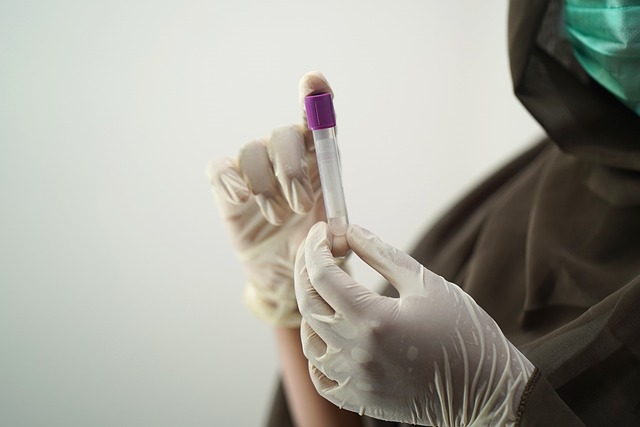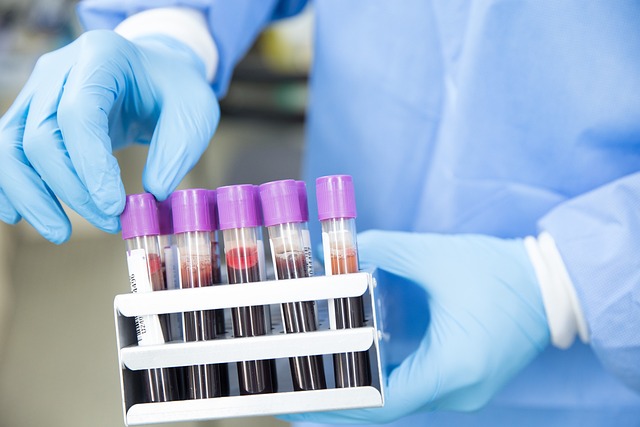The UK Standard Thyroid Blood Test is a critical diagnostic tool for assessing thyroid health, which is intertwined with reproductive wellness, particularly for women seeking pregnancy or facing fertility issues. This test measures TSH, T4, and T3 levels, helping healthcare providers detect thyroid imbalances that can disrupt the menstrual cycle, ovulation, and increase the risk of miscarriages. Its role is to facilitate early diagnosis and intervention, which is vital for mitigating the impact of thyroid dysfunction on fertility. The test also considers ovarian hormones like FSH, LH, estrogen, and progesterone, aiding in the diagnosis of conditions such as PCOS or POI. By providing a comprehensive picture of hormonal health, the UK Standard Thyroid Blood Test enables tailored treatments that can enhance conception rates and support a healthy pregnancy. Healthcare professionals use this test to navigate the complex relationship between thyroid function and reproductive health, aiming for improved patient outcomes by integrating endocrinological and gynecological expertise in managing these issues.
Reproductive health challenges affect millions globally, often rooted in hormonal imbalances. This article illuminates the critical role of hormone analysis, with a particular focus on the UK Standard Thyroid Blood Test as a diagnostic tool. We explore how this test can provide vital insights into thyroid function, a key component of reproductive wellness. Through expert guidance, we delve into the nuances of interpreting hormonal markers in fertility and how integrating thyroid health assessments with reproductive care can lead to more effective treatment outcomes. Understanding these connections is essential for healthcare providers and patients alike on their journey towards reproductive health optimization.
- Decoding Thyroid Health: The Role of the UK Standard Thyroid Blood Test in Reproductive Wellness
- Understanding Hormone Analysis: Key Indicators and Interpretations in the Context of Fertility
- Integrating Thyroid Function with Reproductive Health: A Comprehensive Approach to Hormone Analysis and Management
Decoding Thyroid Health: The Role of the UK Standard Thyroid Blood Test in Reproductive Wellness

The UK Standard Thyroid Blood Test plays a pivotal role in diagnosing and managing thyroid disorders, which can significantly impact reproductive health. This test measures the levels of thyroid-stimulating hormone (TSH), thyroxine (T4), and triiodothyronine (T3) in the blood, providing a comprehensive overview of thyroid function. For women aiming to conceive or those experiencing difficulties with fertility, assessing thyroid health is crucial due to the hormonal interplay between the thyroid gland and the reproductive system. Abnormal levels of thyroid hormones can lead to altered menstrual cycles, ovulation dysfunction, or even miscarriages. By accurately diagnosing thyroid conditions using the UK Standard Thyroid Blood Test, healthcare providers can tailor treatment plans that not only address thyroid imbalances but also improve chances for conception and support a healthy pregnancy.
The integration of the UK Standard Thyroid Blood Test into reproductive wellness assessments is a step towards more personalized care. It underscores the importance of routine thyroid screening for women of reproductive age, especially when facing challenges with fertility. The test’s ability to detect subtle changes in hormone levels can lead to early interventions that may mitigate the effects of thyroid dysfunction on reproductive processes. As such, the UK Standard Thyroid Blood Test is an essential diagnostic tool for healthcare professionals treating patients with reproductive issues, helping them to decipher the complex relationship between thyroid health and reproductive wellness, ultimately guiding them towards optimal health outcomes.
Understanding Hormone Analysis: Key Indicators and Interpretations in the Context of Fertility

Hormone analysis plays a pivotal role in diagnosing and managing reproductive issues, particularly within the context of fertility. In the UK, one of the standard diagnostic tools is the Thyroid Blood Test, which is encompassed under the term ‘UK Standard Thyroid Blood Test.’ This test measures the levels of thyroid stimulating hormone (TSH), thyroxine (T4), and triiodothyronine (T3) in the blood. These hormones are critical as they influence metabolism, growth, and development, which can all affect fertility. Abnormal levels of these hormones can lead to conditions such as hypothyroidism or hyperthyroidism, both of which can impact a woman’s menstrual cycle and ovulation process. The interpretation of these results is nuanced; for instance, slight variations in TSH levels can indicate thyroid dysfunction that may need treatment to optimize fertility outcomes.
Furthermore, the evaluation of ovarian hormones, such as follicle-stimulating hormone (FSH) and luteinizing hormone (LH), alongside estrogen and progesterone, is equally important. These hormones are integral to the menstrual cycle, governing the recruitment and maturation of oocytes. Analyzing their levels can help in identifying conditions like polycystic ovary syndrome (PCOS) or premature ovarian insufficiency (POI). Healthcare providers use these assessments to tailor treatments that can enhance the chances of conception. It is through this detailed hormone analysis that healthcare professionals can pinpoint the root cause of fertility issues and devise effective interventions, thereby improving the chances of successful pregnancy outcomes for individuals across the UK.
Integrating Thyroid Function with Reproductive Health: A Comprehensive Approach to Hormone Analysis and Management

Understanding the intricate relationship between thyroid function and reproductive health is pivotal for comprehensive hormone analysis and management, particularly in the UK where the Standard Thyroid Blood Test is a commonly utilized diagnostic tool. The thyroid gland, situated in the neck, plays a critical role in regulating metabolism, which directly affects ovulation and menstrual regularity in women. When thyroid function is askew, whether it’s hyperthyroidism or hypothyroidism, it can lead to a host of reproductive issues such as infertility, irregular periods, or recurrent miscarriages. Healthcare professionals in the UK often recommend the UK Standard Thyroid Blood Test as part of a thorough evaluation for women experiencing reproductive problems. This test measures key thyroid hormones like TSH (thyroid-stimulating hormone), Free T4, and sometimes Free T3, providing insights into the gland’s activity. Integrating the results of this test with clinical observations allows for personalized treatment plans that address both thyroid health and reproductive concerns.
The integration of thyroid function assessment within the broader context of reproductive health management is not merely a one-off test but an ongoing process. It involves regular monitoring and adjustment of treatment as necessary, ensuring that hormonal imbalances are managed effectively. For instance, if a woman is found to have hypothyroidism, which can impair ovulation, thyroid hormone replacement therapy may be prescribed. Conversely, in cases of hyperthyroidism, medications to reduce thyroid hormone production might be required. By tailoring medical interventions based on comprehensive hormone analysis, including the UK Standard Thyroid Blood Test, healthcare providers can significantly improve outcomes for those with reproductive health issues co-occurring with thyroid dysfunction. This holistic approach underscores the importance of a coordinated care strategy that encompasses both endocrinological and gynecological perspectives.
In conclusion, hormone analysis, particularly the UK Standard Thyroid Blood Test, plays a pivotal role in addressing reproductive issues. By decoding thyroid health and integrating its function with reproductive health, healthcare professionals can offer a more comprehensive approach to hormone management. The insights gleaned from understanding key indicators within fertility contexts underscore the importance of such analyses. For individuals experiencing reproductive challenges, these tests provide valuable information that can guide effective treatment strategies and improve outcomes. Therefore, healthcare systems should prioritize access to thorough hormone analysis like the UK Standard Thyroid Blood Test as part of a holistic strategy for reproductive wellness.
